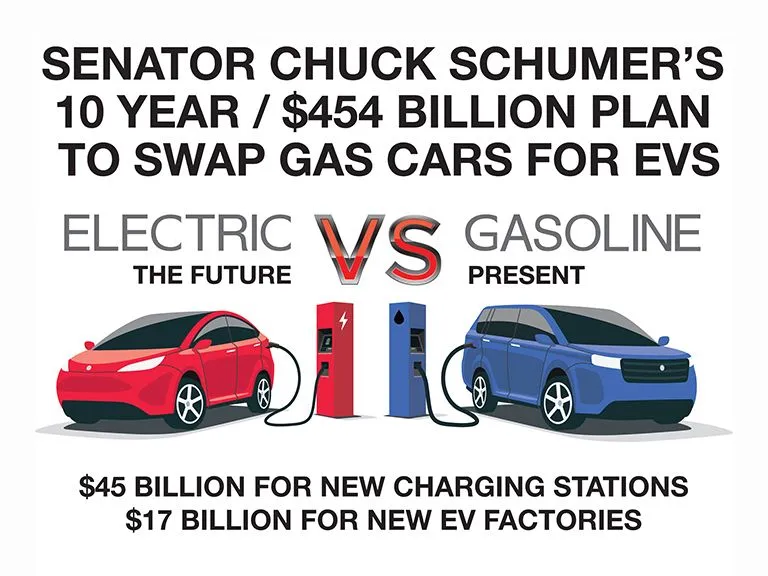
Senator Schumer's insightful proposal to swap gas cars for EVs provides huge incentives
In October 2019, Senator Chuck Schumer released a plan to provide rebates of $3,000 or more to electric vehicle buyers transitioning away from fossil fuel cars. Over a 10-year period this would replace 25% of the gas cars in the US fleet – 63 million vehicles – with electric vehicles, plug-in hybrids or fuel-cell cars.
By John Coulter, CMO, CURRENT EV
Noting that the transportation sector accounts for nearly one-third of USA CO2 output, Schumer said his plan would reduce the impact of climate change. $392 billion of the $454 billion would be allocated for use as subsidies for owners of gas-powered vehicles at least 8-years old and in driving condition. Owners would trade them for an e-mobility car. The old vehicles would be scrapped rather than resold, preventing them from spewing additional pollutants.
The plan, announced by Schumer in an op-ed piece called "A Bold Plan for Clean Cars" in the New York Times, suggests that it could help make "all vehicles on the road . . . clean" by 2040. Since the plan would require that the EV or hybrid vehicles be made in the United States, he claims it would also "spur a transformation in American manufacturing."
Schumer’s proposal comes as both Democrats and Republicans are looking to win the support of auto workers in key Midwestern swing states who could be key to determining if President Donald Trump is re-elected and who controls Congress in the November 2020 elections.
Car buyers would get rebates ranging from $3,000 to $5,000 or more, plus another $2,000 for low-income buyers for the purchase of U.S.-made vehicles. Schumer’s plan would “reduce the number of carbon-emitting cars on the road, create thousands of good-paying jobs, and accelerate the transition to net-zero carbon emissions by mid-century.” It would adopt rules similar to the 2009 $3 billion “Cash for Clunkers” plan that sought to stimulate U.S. auto sales.
Schumer’s proposal would earmark $45 billion for additional EV charging stations to be built in the USA, particularly in underserved areas such as rural and low-income communities. An additional $17 billion in incentives would be provided to automakers to build new assembly plants or retool existing ones to assemble zero-emission vehicles or charging equipment, with a goal that by 2040 “all vehicles on the road should be clean.”
In August 2018, the Trump administration proposed rolling back Obama-era fuel efficiency requirements through 2026, with a “preferred option” to increase U.S. oil consumption by about 500,000 barrels a day. Whether or not this will happen remains to be seen, as 23 states, led by California, have banded together to fight the government's proposed regulatory rollback. California has set its own emissions standards for decades to combat the smog that used to blanket its major cities. Other states have chosen to follow in California's footsteps. When combined, this group of green-minded states equals roughly one-third of the US auto market. In September of 2019, they sued the federal government to prevent the roll-back regulations.
According to papers filed in the U.S. District Court in Washington, the 23 states, plus DC and the cities of New York and Los Angeles, are seeking a court order to block the Trump administrations easing of standards determination unveiled by the U.S. Transportation Department and the National Highway Traffic Safety Administration. “Mr. President, we’ll see you in court,” California Attorney General Xavier Becerra said in a statement. The resulting legal quagmire could push the case into the US Supreme Court.
Schumer’s NY Times op-ed piece indicates he has the support of environmental groups like the Sierra Club and Natural Resources Defense Council, and the League of Conservation Voters and labor unions. Ford and GM, which are both spending billions to develop electric vehicles, said they appreciated Schumer’s plan, with GM praising the effort to “advance electrification through much-needed infrastructure investments, consumer incentives and promotion of American electric vehicle manufacturing.” UAW President Gary Jones said in a statement that the Schumer proposal “honors the sweat and sacrifice of American autoworkers by investing in domestic manufacturing of electric vehicles and incentivizing high quality jobs across the auto supply chain.”
Schumer intends to introduce his plan as an element of "bold and far-reaching" climate legislation in November 2020, hoping that at that point, Democrats will control the Senate and he’ll be the majority leader, making his plan far easier to pass.
https://www.nytimes.com/2019/10/24/opinion/chuck-schumer-electric-car.html
Recent Posts
- The 2022 Audi Q4 e-Tron SUV combines performance, practicality and luxury
- Ford's 2022 F150 Lightning All-Electric Truck is in high demand
- Legendary Audi performance is at the heart of the 2022 Audi e-tron GT and its RS sibling.
- Meet the Lexus RZ 450e – the luxury brand’s 1st EV
- The 2022 GV60 is Genesis’ first all-electric vehicle

